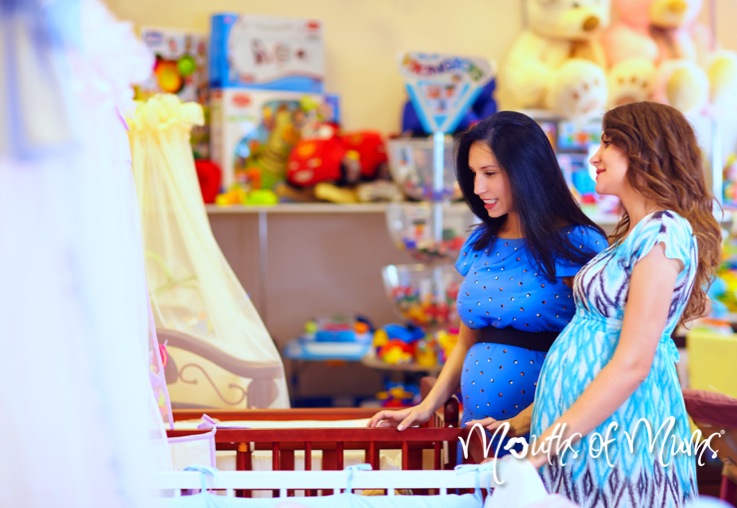Having a child is not for the financially fainthearted.
In fact, you need to be mentally (and physically) prepared for your brand new bundle of joy to throw serious amounts of cash around (tossing twenties out of my wallet is one of my toddler’s favourite games).
Some researchers claim that by the time they’re 18, they will have cost you over $1 million – and that’s just for one child.
Fortunately, the latest AMP/NATSEM Cost of Kids report has found that children get more expensive as they get older so you have time to ease yourself into it.
But a newborn still has the capability to rock the family budget, particularly if you or your partner are planning to take time off work.
Before you start hyperventilating, take a seat, breathe deeply and develop a plan of attack. Here are some tips:
1) Save like crazy
Without freaking you out entirely, the more you save in the nine months leading up to the baby, the better prepared you’ll feel and the more relaxed you’ll be. AMP/NATSEM estimate that families spend an average of $144 a week on a child under 5. While this figure sounds pretty manageable, don’t forget, there are plenty of things to pay for leading up to their arrival. Set aside some money every week and stick it into a savings account. Or, if you have a mortgage, keep it in your offset account and you’ll save on interest repayments as well.
2) Sign up for parental leave
The Federal Government’s parent paid parental leave (PPL) provides one parent with the national minimum wage for up to 18 weeks after your child is born, providing you’re not working at that time and meet certain eligibility criteria. The earlier you sign up for it the better, as the paperwork can take a while to process.
Your employer might also offer paid parental leave, but be aware, there is legislation currently before parliament that, if passed, will stop parents from what they call ‘double dipping’ – that is, being able to access the government payment if they receive PPL from their employer.
3) Pay off your debts
It’s a hard thing to do, but now is the time to make headway into reducing any debts you might have. When the baby comes, you’ll have difficulty remembering what day of the week it is, let alone when to make that all-important credit card payment and the last thing you want is to be doing is throwing money away on interest repayments. Think about switching to a low interest credit card or if you’re completely on top of your finances, ditch the credit card and use your debit card instead. There’s some great transaction accounts on the market these days with no fees, pay wave cashback offers and no ATM withdrawal fees such as ING’s Orange everyday account.
4) Think about where you want to live
Are you currently renting? Now might be the time to dust off those plans to move into your own home, especially if you have a particular suburb in mind. One thing in life that is guaranteed is that when your little one gets closer to school age, school catchment areas become quite the barbeque stopper. You don’t have to move straight away, but having a plan may free up your mind to focus on challenges more immediately in front of you (such as running out of nappies at 1 am).
5) Buy in bulk
Is dishwashing detergent on special at the supermarket? Buy 10 of them. Not only will you save money, you also won’t have to worry about running out for at least the next six months. Of course, that’s easier said than done – you still have to get them home and find somewhere to store them. Once the baby’s arrived, home delivered groceries can become your best friend so look out for free delivery specials and be sure to shop around (online that is).
6) Sign up to second-hand websites
Nine months is a really long time to wait for anything. But there is one good thing about the protracted wait for your new family member – it gives you time to research.
Cots, change tables, toys, bouncers and highchairs. Every family needs them but only for a limited time. Instead of heading to the shops, see what you can pick up on eBay, Gumtree or your local Buy, Sell, Swap group on Facebook. It’s amazing how addictive (and competitive) bargain hunting can be. And after a few years when your little one has grown up and out of that swing, sell it on to another expectant parent and you’ll probably end up even (maybe even ahead, if you’re a seasoned haggler).
7) Childcare
It’s the dreaded post baby word that makes juggling oranges, eight at a time, seem like child’s play. There are options out there, but the task is daunting and finding one that a) you like, b) can take your baby on the days you want and c) isn’t 10 kilometres in the wrong direction to your job isn’t guaranteed. If you are thinking about going back to work within the first three years, sign up for as many local centres you can. Some places won’t accept applications until after the baby’s on the outside, but plenty of others will. The Government’s mychild site is a good start to find out what centres are in your area.
When factoring in the costs of childcare, don’t forget that some low-income families are eligible for the childcare benefit and most families are eligible for the childcare rebate, which is not income tested. The childcare rebate pays up to 50 per cent of your childcare fees, up to $7, 500 per child, so it’s well worth applying for.
You may also be eligible for other government payments, such as Family Tax Benefit Part A and B. To find out more, visit the Department of Human Resources website.
8) Healthcare
Medical bills can put serious strain on any family budget. Try and find a GP who specialises in babies. It will help put your mind at ease every time rush to the doctor to check on the latest rash/temperature/weird spot on their forehead you swore wasn’t there last time you looked. A lot of practices bulk bill children under a certain age, which is also extremely handy, as you don’t want to hesitate about taking your baby to the doctor.
If you have private health insurance and want your baby to be covered as well, make sure do this well before the baby’s due date, in case it is born prematurely. It’s been recently reported that the average cost of having a baby in a private hospital is now over $8,500 so if you are heading down that route, you want to make sure you are properly covered.
Image courtesy of Shutterstock.com
Written by Sally Tindall, RateCity.com.au Money Editor.





















1:01 pm
4:25 pm
6:41 pm
8:15 am
9:27 pm
8:30 pm
10:05 am
9:46 pm
-

-
-
musicmum replied
- 05 Oct 2018 , 9:21 pm
Reply8:40 pm
9:31 pm
8:22 am
1:29 pm
10:45 am
1:05 pm
3:33 pm
10:08 pm
7:22 pm
3:00 am
9:21 am
9:20 am
- 1
- 2
- »
Post a commentTo post a review/comment please join us or login so we can allocate your points.